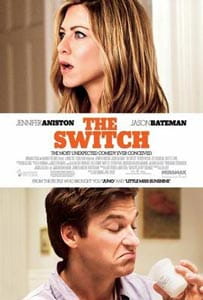By Mary Rose Somarriba
 Jennifer Aniston’s big new movie made headlines last month -- for flopping. The Switch, a romantic comedy about a forty-year-old single woman who wants a baby and chooses to be artificially inseminated, brought in embarrassingly low-ticket sales of only $8.4 million on opening weekend. Hollywood reporters have tried to think of all number of reasons for why it flopped so badly, ranging from the myth of lazy August filmgoers to the theory that Aniston is a blockbuster buzzkill.
Jennifer Aniston’s big new movie made headlines last month -- for flopping. The Switch, a romantic comedy about a forty-year-old single woman who wants a baby and chooses to be artificially inseminated, brought in embarrassingly low-ticket sales of only $8.4 million on opening weekend. Hollywood reporters have tried to think of all number of reasons for why it flopped so badly, ranging from the myth of lazy August filmgoers to the theory that Aniston is a blockbuster buzzkill.
But the answer may be the story itself. Just four months ago, Jennifer Lopez’s film on the same subject, The Back-up Plan, which came out this week on DVD, opened to a low $12.2 million. As reporters Gregg Kilday and Kim Masters put it, “Artificial insemination, it turns out, is the new box-office poison.”
And they’re right: These movies are failing because the American public doesn’t like to laugh about artificial insemination. It doesn’t strike Americans as either romantic or comedy. Because it isn’t.
There’s something sad about forty-one-year-old Aniston playing the older woman who has no marriage prospects and wants a family. There’s something sad about hearing her say onscreen: “Why wait? I am getting older and my biological clock is ticking. . . . I am in the market for some semen.” There’s something sad about hearing Jennifer Lopez say, “Maybe this isn’t how I pictured it. . . . I thought I’d be married with kids by now, but that’s just not happening, so, guess it’s time for my back-up plan!”
What’s sad is that some real, deep aspects of the human experience -- such as the realization of one’s aging, the desire for love and family, and the sorrow of lost time -- are covered up with chipper confidence that none of these things matter anymore. Age doesn’t matter. Time is never lost.
Love and commitment aren’t necessary; in fact, they’re not even worth seeking. You can start a family all on your own. It’s a Do-It-Yourself Family! The biological bond required to conceive a child -- a male’s sperm and a female’s egg -- is all you need; you don’t need the metaphysical and the personal bond with another to make a family.
Surely they value love and commitment; they want love and commitment to be an essential part of their relationship with their children, don’t they? Nobody doubts it. But how does one expect these to translate into relationships with their kids if the parent doesn’t value love and commitment in their own lives to start with? It’s one of those questions that isn’t asked and is laughed off.
And they don’t quite pull it off. There’s something gross about hearing the doctor cheerfully tell Lopez, “I have a feeling that you and [sperm donor number] ‘CRM1014’ are going to have beautiful babies together.” There’s something jarringly real when we hear Lopez’s costar Alex O'Loughlin exclaim in horror: “You’re pregnant with some stranger’s child?”
In The Switch, it’s not some stranger’s child, it’s her friend Wally’s child, only she didn’t know he performed “the switch,” exchanging the sperm donor’s semen with his own. As Wally (played by Jason Bateman) later put it, “I hijacked her pregnancy.” “Ohh,” replies his friend Leonard (Jeff Goldblum), in a perfectly delivered line, “that was ill-advised.”
The truth is artificial reproductive technology is ill-advised, and not just because it separates love from family. Biologically, it’s a very bad idea.
Many women who undergo in vitro fertilization suffer the physical effects of unnatural hormonal manipulation before conceiving, and some suffer these effects and never conceive. Many women experience years of unsuccessful attempts, ectopic pregnancies, miscarriages, and premature birth, which can result in early death of the child. Many women, when they finally conceive, conceive multiple babies at once, sometimes more than they could healthily bring to term, and have the traumatic experience of having to decide which one of their long-wished-for children they will terminate.
Add all this suffering to the immeasurable emotional pain many women experience for being infertile in the first place. It’s a very hard road.
Further, the health risks to women who donate their eggs are many and are largely undocumented, as the recent documentary Eggsploitation, produced by the Center for Bioethics and Culture, reports. And we haven’t even gotten to the health risks to the child, provided he or she makes it out alive.




